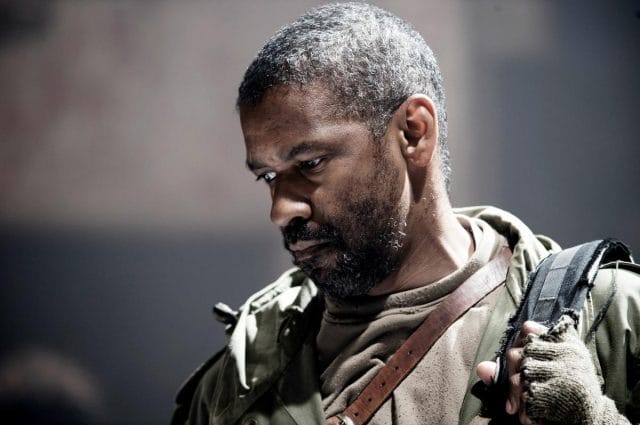
“The big story this year is diversity. This is the most diverse group of nominees in Emmy history. So congratulations Hollywood, you did it! Racism is over! Don’t fact check that.”
– Andy Samberg at the 2015 Emmy Awards
![]()
Twenty years ago, no one would have thought that black action stars would be on the endangered species list.
Back then, a young Will Smith had just saved mankind from the tentacles of invading aliens in Independence Day. Denzel Washington had prevented a nuclear war as the executive officer of an American submarine in Crimson Tide. And Samuel L. Jackson had quoted Bible passages as he executed disloyal criminals in Pulp Fiction.
“Hollywood’s newest leading men,” Joy Bennett Kinnon wrote in Ebony’s January 1997 issue, “are increasingly named Morgan, Denzel, Samuel and Wesley, not necessarily Mel, Tom and Sly.”
The black stars of the 1990s are still kicking ass onscreen today. Over the past 5 years, Denzel Washington has wielded a gun in four action flicks. A one-eyed Samuel L. Jackson appears regularly in Marvel movies to admonish the Avengers. Will Smith was even expected to reprise his role in the forthcoming Independence Day: Resurgence—until Smith reportedly tired of sequels and the studio decided he was “too expensive.”
But the black action star is aging. Smith, Denzel, and Jackson are all over 45-years-old, and with the exception of Smith’s son Jaden, they don’t have obvious understudies.
In his latest action film, The Equalizer, Denzel Washington comes out of retirement to take on bad guys. It feels like a metaphor for the actor as well. Washington is 60-years-old, and he can’t play the action star forever.
When he and his peers retire, will the black action star go extinct in Hollywood?
The Aging Stars
Hollywood critics and journalists have noticed the lack of young black actors onscreen. “Who will be the next Denzel?” Rebecca Ford asked in The Hollywood Reporter last year. The president of the African American Film Critics Association told Ford, “There really aren’t a lot of names that come to mind… We haven’t really done enough to cultivate the next generation.”
If you look for big-budget movies with black leads, the lack of youth is striking. Most of the names—Smith, Denzel, Jackson—are familiar from the 1990s. If the same were true of white actors, Chris Evans, Joseph Gordon-Levitt, and Bradley Cooper would have never appeared onscreen, and Bruce Willis, Tom Hanks, and Alec Baldwin would still play all the action roles.
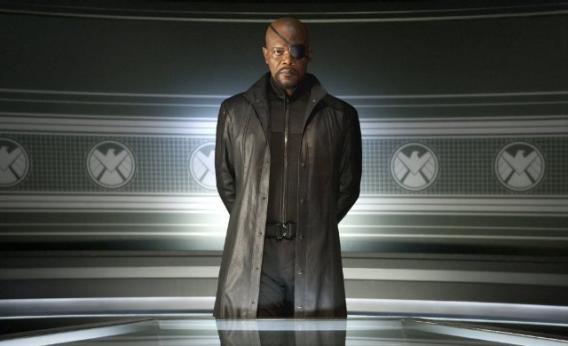
To imbue this perception—of a dearth of young black stars—with the firm reality of numbers, we assembled a list of films that star or co-star black actors. Using information from Box Office Mojo, we constrained our list to hit movies: those that ranked among the top 50 in terms of domestic box office performance the year of their release.
If you haven’t noticed that the black action star is at risk of extinction, you’re not without reason. The number of hit movies starring black actors has trended down. But that’s not the case with action movies.
When we only include films where black actors truly starred or co-starred in a film—and therefore exclude cases like Samuel L. Jackson in The Avengers—the number of action films released by Hollywood has been constant since 1996: a steady, limited output.
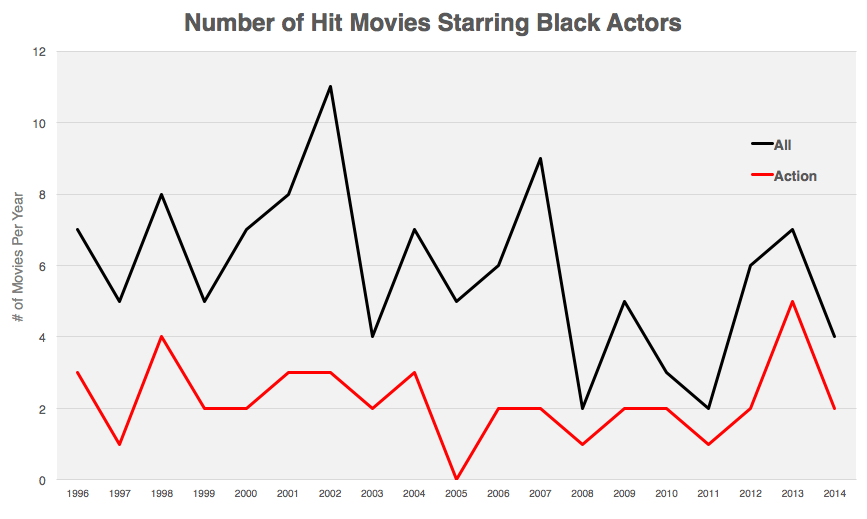
Chart by Priceonomics; data via Box Office Mojo
When we look at the age of black actors, however, it becomes obvious that Hollywood hasn’t given young black actors the same opportunities that helped Will Smith, Wesley Snipes, and Denzel Washington launch their careers.
Several teenagers had star roles in the 2000s: Bow Wow in Like Mike, Nick Cannon in Drumline, and Will Smith’s son Jaden in multiple films. But Jaden Smith is the only one currently cast in a movie, and the only movie he has starred in without his father, The Karate Kid, was not an action movie.
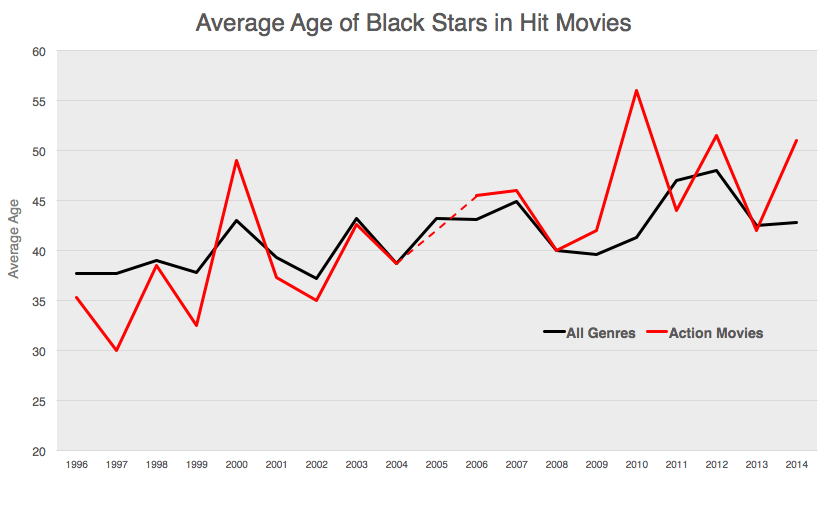
Chart by Priceonomics; data via Box Office Mojo
In recent years, the relative youngsters cast in action movies are Vin Diesel (48), Jamie Foxx (47), and Dwayne Johnson (43). Since the mid 90s, the average age of black action stars has increased by over 10 years in less than two decades.
Several young black actors are leading movies that perform well at the box office, but they are comedies or action comedies. In 2014, Kevin Hart co-starred in Ride Along at age 35, and Damon Wayans Jr. co-starred in Let’s Be Cops as a 32-year-old. But even if Hart and Wayans Jr. change genres, they will be middle-aged before they achieve action hero status.
Not all action stars are getting older. The graying of black stars is not part of an industry-wide preference for older heroes or a misinterpretation of Millennials’ adoration for Ruth Bader Ginsburg and Bernie Sanders. If anything, white action stars are younger today than in the mid 90s.
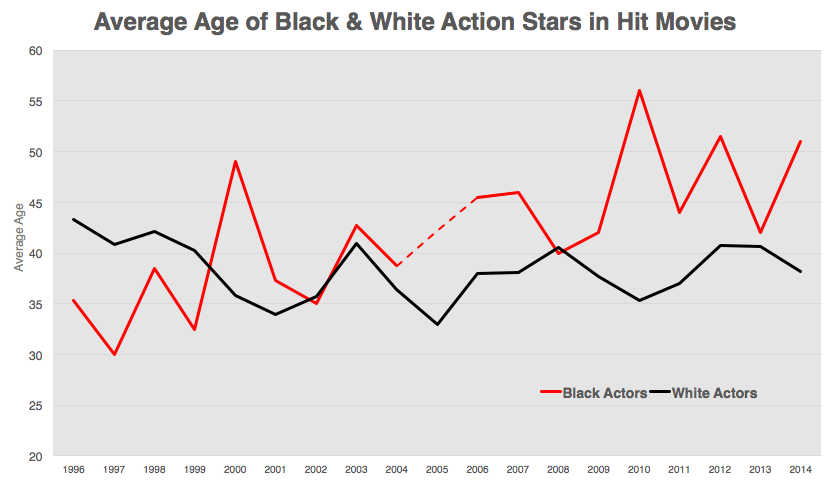
Chart by Priceonomics; data via Box Office Mojo
Hollywood has a deep bench of young actors with experience saving the day: Liam Hemsworth of Hunger Games fame is 25-years-old. Chris Pratt is 36. Today’s Captain Kirk, Chris Pine, is 35. Aaron Taylor Johnson—who acted kinda heroic while Godzilla saved the world—is 25.
But almost none of those young action stars are black. When Will Smith dropped out of Independence Day: Resurgence, the studio considered casting Michael B. Jordan, a young, black actor. Then the executives decided to add Liam Hemsworth—who is white—to the cast instead.
So why haven’t young black actors gotten these roles?
Theory One: Everyone Else is Racist
“I believe that the international motion picture audience is racist — in general, pictures with an African American lead don’t play well overseas.”
– Internal email between Sony Executives
In 2014, WikiLeaks published a trove of internal Sony Pictures emails. It included this conversation among anonymous Sony executives, in which an exec argued that Sony needed to focus on making movies like The Hunger Games: films that can launch franchises and rake in money overseas.
That second part is crucial. As the executive notes, big hits in Hollywood now make most of their box office money (65% or more) overseas. This is why Hollywood tailors its scripts to the liking of China’s censorship board—the gateway to the world’s second largest movie market—and increasingly focuses on action movies. After all, jokes and intimate conversations can be lost in translation, but robots fighting aliens is a universal language.
According to the Sony executive, the importance of overseas markets also means that studios shouldn’t spend too much money on movies with black leads. The executive calls Denzel Washington “the best actor of his generation,” but laments that Washington’s latest movies made under 50% of their box office revenues abroad. In his or her opinion, international audiences are too racist to risk casting a black actor in a blockbuster.
The problem with this theory is a lack of evidence.
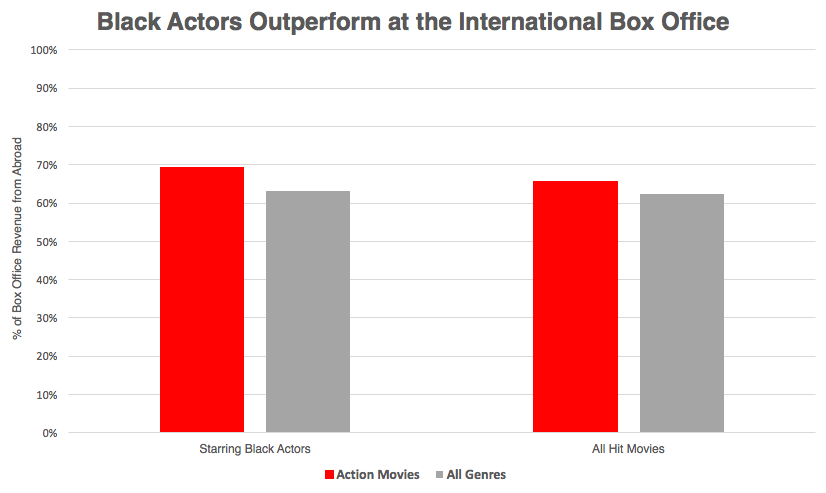
Chart by Priceonomics; data via Box Office Mojo
Washington’s latest movies have made most of their money in American theaters. But when we look at hit movies (that grossed over $100 million worldwide), we find that films starring black actors make just as much of their revenue abroad as other movies. And The Fast and the Furious films, which star Vin Diesel—who describes himself as of ambiguous ethnicity but definitely a person of color—crush it absolutely everywhere. The Fast and the Furious is Universal Studios’ biggest franchise, and the latest films grossed 70-75% of their revenues abroad.
If international audiences are more racist than American moviegoers, it’s not evident from the numbers.
Hollywood is famously non-transparent, so it’s difficult to know how many executives share this worry about casting actors of color. If enough studios believe it, even falsely, the increasing importance of the foreign box office take could be holding black actors back.
But Hollywood can’t point a finger elsewhere to explain why it’s not casting black actors as action heroes.
Theory Two: The Superhero Effect
Another possible explanation for the dearth of young, black action stars is that they have been left out of Hollywood’s superhero craze. Black actors and actresses have co-starred in X-Men (Halle Berry), The Avengers (Samuel L. Jackson), Iron Man (Don Cheadle), and The Fantastic Four (Michael B. Jordan). But few have played the lead.
For young white men, however, the superhero craze has been a career-launching machine. Since superhero films are expensive and the franchise already has name-recognition, studios happily cast unknowns. “They’re looking at seven actors. You’ve heard of two of them,” Hollywood journalist Nikki Finke told the New York Times in 2014 to describe the casting process. “They all have names like Joe and Josh. It’s impossible to keep them straight.”
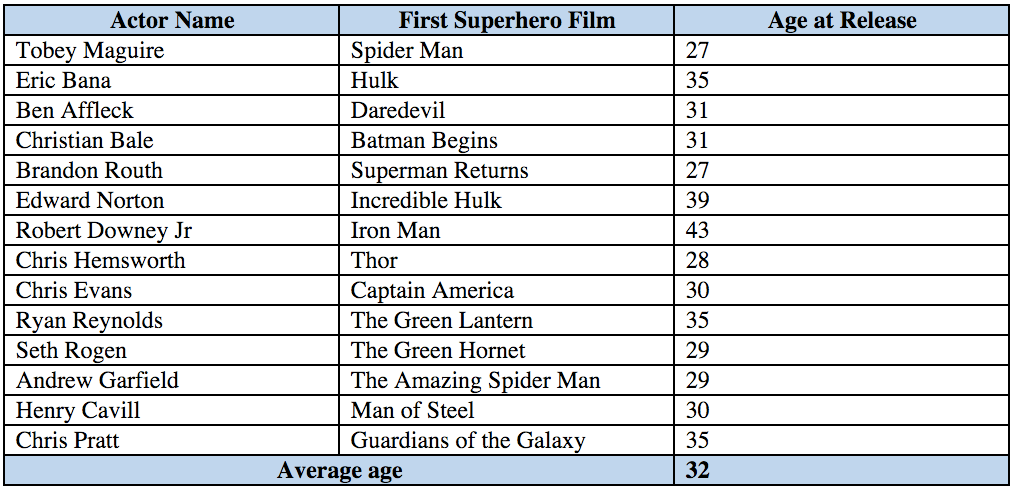
Without access to a parallel universe in which no one likes comic book movies, it’s hard to test this theory out. But it’s fairly obvious that the superhero craze, which began in earnest in the early 2000s, has benefited many young, white actors. Guardians of the Galaxy made Chris Pratt a household name at age 35, and helped him land the lead role in Jurassic Park. Tobey Maguire owes his early rise to fame to the Spider Man franchise, as he landed the role as Spidey at age 27.
With black actors largely excluded from this career-launching process, it’s not surprising that we see fewer black action stars.
Theory Three: This is the Transition Moment
When Will Smith and Denzel Washington became stars in the early nineties, they were the first generation of global black movie stars.
“For a long time when you thought of a Black male star, it was Sidney Poitier, Sidney Poitier, Sidney Poitier,” casting director Reuben Cannon told Ebony in 1997. (Poitier had won an Oscar for Best Actor in 1963.) “Now we have Morgan, Danny, Laurence Fishburne, Denzel and Wesley.”
As the first generation of black stars, many of these actors, especially Denzel Washington and Will Smith, achieved fame at a very young age. Hollywood loves actors with name-recognition, and actors like Will Smith, “the most powerful actor in Hollywood,” were easy to cast. The dearth of young, black action heroes might be the result of this first generation’s long shadow. Of their super-fame crowding out the market for black stars.
If this is true, the graying of Washington and Smith might finally force Hollywood to find new stars.
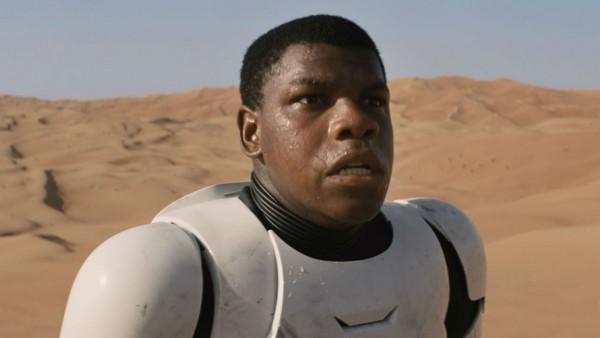
In Rebecca Ford’s article “Who is the New Denzel?”, she identifies several black actors who are “on the cusp.” Although the Fantastic Four flopped, Michael B. Jordan could gain renown if the next installment does better. Twenty-three-year-old John Boyega is cast in the new Star Wars film. And Chadwick Boseman, who has been asked to play every famous black celebrity from James Brown to Jackie Robinson, is cast in the upcoming adventure film Gods of Egypt.
Most importantly, Idris Elba has been rumored over and over as a candidate to take over the Bond franchise.
Maybe the torch is about to be passed.
![]()
We don’t know why Hollywood has not given young, black actors the opportunity to become action stars. Each of these three theories could contribute to the problem. It could simply be that Hollywood has made racial equality less of a priority, and that racism and bias is resurgent in Hollywood and among American audiences.
It’s a common belief in America on matters of race and sex that progress is slowly being made. That perception is evident in Andy Samberg’s statement at the Emmy Awards that “The big story this year is diversity. This is the most diverse group of nominees in Emmy history.”
The decline of the black action star is hardly the first phenomenon to challenge to this belief.
One reason that Samberg called the Emmy nominees the “most diverse” in Emmy history was that 2 of the 7 nominees for Outstanding Comedy Series were created by women. Yet in 1990, half of the nominated shows were created by women. Nell Scovell pointed this out in the New York Times. “The ‘Golden Age for Women in TV,’” she wrote, “is actually a rerun.”
Moments like these challenge assumptions of steady progress. The harder question to ask is where else, outside of Hollywood, this comfortable assumption of progress is equally false.
![]()
In our next post, we explore whether business plan competitions can save the world… or not. To get notified when we post it → join our email list.
![]()
This post was written by Alex Mayyasi. You can follow him on Twitter at @amayyasi.



